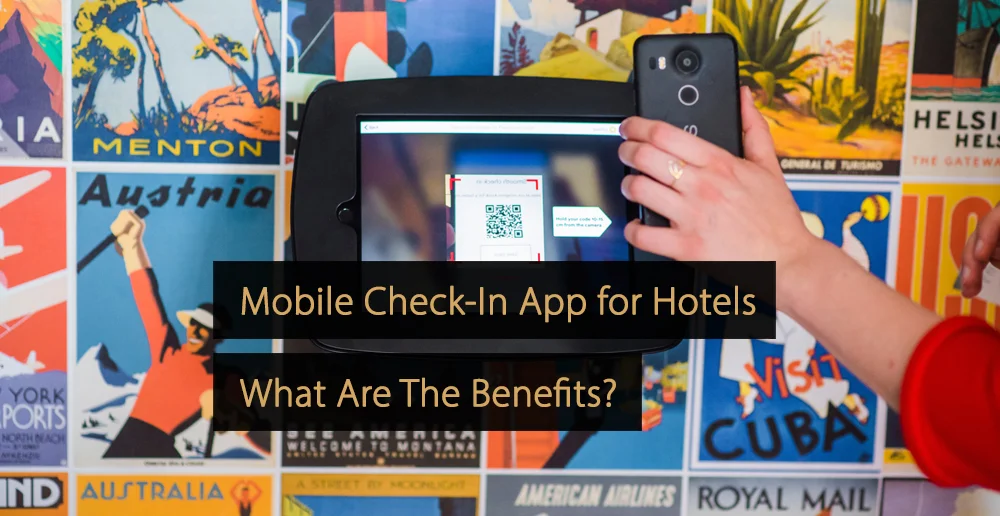In recent years, mobile check-in apps for hotels gained popularity due to the efficiency of guests and hotels. Since the check-in process is contactless and more hygienic, it has gotten an extra boost since the coronavirus pandemic. Not only do these methods cater to the needs of tech-savvy customers, but they can enhance the brand reputation of the property in question. Let us now examine each of these concepts in greater detail.
What is Mobile Hotel Check-in?
We know that hotel technology plays an important role in these modern times. As a growing number of individuals are leveraging the power of wireless connectivity, it only makes sense that these services are becoming present throughout the hotel industry. Mobile check-in methods will now enable guests to secure a room and gain access to the property without the need for a traditional key. However, we are only beginning to scratch the surface. Let us now look at how this innovative solution works in greater detail.
How to do Mobile Check-In Services Function Within Hotel Settings?
This type of keyless entry method essentially embraces technology that already exists. For instance, guests are often allowed to perform specific actions within a hotel thanks to a dedicated smartphone application. Examples include ordering food, reserving transportation, and discovering nearby attractions. It, therefore, makes sense that wireless check-in technology has become a reality.
Typically, guests will first register for a specific preferred guest program. They can then book a room directly via the associated smartphone application. Upon approval, the hotel will send a confirmation containing a personal identification code and room number. Customers can then enter the property and place their smartphones in front of the wireless key reader attached to the door. The door will unlock once the information is read correctly, and they can enjoy a seamless check-in experience.
Six Pronounced Benefits Associated with Mobile Hotel Check-In Services
Now that the mobile check-in process has been explained from a general point of view, it is only logical to highlight some of the main advantages your property can expect to leverage. Let us examine six windfalls that would not be possible with traditional check-in services.
1. Enhancing the Customer Experience
Client engagement is crucial today, as guests are (rightfully) more demanding than ever before. Therefore, the ability to offer them a streamlined means to complete the check-in process is pivotal for convenience. Furthermore, mobile check-in systems clearly illustrate that the property knows the latest technological trends. This mindset will let guests feel that other needs can be catered to promptly. It is well-known that end-user experiences ultimately define important metrics such as your RevPAR.
2. Temporal Considerations
There are many instances when guests are pressed for time during the check-in and check-out processes. It, therefore, makes perfect sense that modern hotel trends have been focusing on how such daunting logistics can be addressed. Keyless entry systems are highly efficient in terms of the overall customer experience. Furthermore, they reduce the logistical burdens that would otherwise be placed upon in-house staff, enabling your employees to deal with other concerns.
3. Pronounced Sales and Marketing Opportunities
It is a well-known fact that up-selling is an important trend within the hotel management sector. This strategy works especially well during the initial stages of the booking process. Guests can be presented with unique opportunities including (but not limited to):
- Preferred restaurant bookings;
- Rebates if they choose to upgrade their room;
- Luxury options such as on-site spas and saunas.
This is just as relevant regarding off-site options such as discounted tours at a local museum or guided excursions to nearby landmarks. It may even be possible for your hotel to accrue a small commission through such third-party options. Either way, guests can access these and other possibilities by clicking a button.
4. Rising Above the Competition
It is no secret that the hotel industry faces more competition than ever. While traditional metrics such as room condition and representatives’ disposition are important, we have witnessed a massive paradigm shift toward the digital age. This is why even smaller boutique properties have incorporated such methods into their current sales and marketing strategies.
Being able to cater to the needs of modern guests is crucial in terms of how your hotel is rated. It will often determine whether a client chooses to employ your property in the future or instead looks elsewhere (perhaps to one of your main competitors). It, therefore, makes perfect sense that mobile check-in platforms have enjoyed such a pronounced presence in recent times.
5. Boosting Online (and Real-World) Brand Loyalty
Hotels are concerned with the notion of brand loyalty. This is achieved through several methods, such as:
- Providing guests with an unforgettable experience;
- Offering personalized services;
- Reducing logistical complications while enhancing convenience;
- Money-saving discounts and similar strategies evoke a real sense of value.
Mobile check-in services can add “another string to the bow” regarding what your property can offer guests. As a result, even first-time customers will likely view their experiences favorably, increasing the chances that they will choose your property.
6. Ensuring Future Bookings
Future bookings are key to long-term success within the hotel sector. Keyless entry systems essentially signify that your property is in the guest’s pocket; all services can be accessed with a single swipe of the finger. Furthermore, it is possible to include important information within the application itself, such as:
- The location of the hotel;
- Check-in and check-out times;
- Straightforward booking procedures;
- How to immediately contact a representative.
Another immensely beneficial strategy is to offer discounts in the future should guests choose to book a reservation directly through the application. The future of the hotel sector does indeed look bright!
Video: Hilton’s Mobile Check-In
Below is a video about why Hilton’s mobile check-in means staff can focus on customer delight.
Video: Pass the hotel, Check-In Line
Below is a video comparing the traditional check-in vs. a mobile check-in procedure.
The Marriott Bonvoy Check-In App
The mobile check-in app from Marriott lets you check in before you arrive. You can even do it from the middle seat on your flight, giving you something to look forward to.
We can therefore see why mobile check-in services are set to become the mainstay of the entire hotel sector. This is also why adopting these techniques sooner rather than later is important if you hope to remain well ahead of the competition.
More Tips to Grow Your Business
Revfine.com is the leading knowledge platform for the hospitality and travel industry. Professionals use our insights, strategies, and actionable tips to get inspired, optimize revenue, innovate processes, and improve customer experience.Explore expert advice on management, marketing, revenue management, operations, software, and technology in our dedicated Hotel, Hospitality, and Travel & Tourism categories.
This article is written by:
Hi, I am Martijn Barten, founder of Revfine.com. With 20 years of experience in the hospitality industry, I specialize in optimizing revenue by combining revenue management with marketing strategies. I have successfully developed, implemented, and managed revenue management and marketing strategies for individual properties and multi-property portfolios.









Leave A Comment